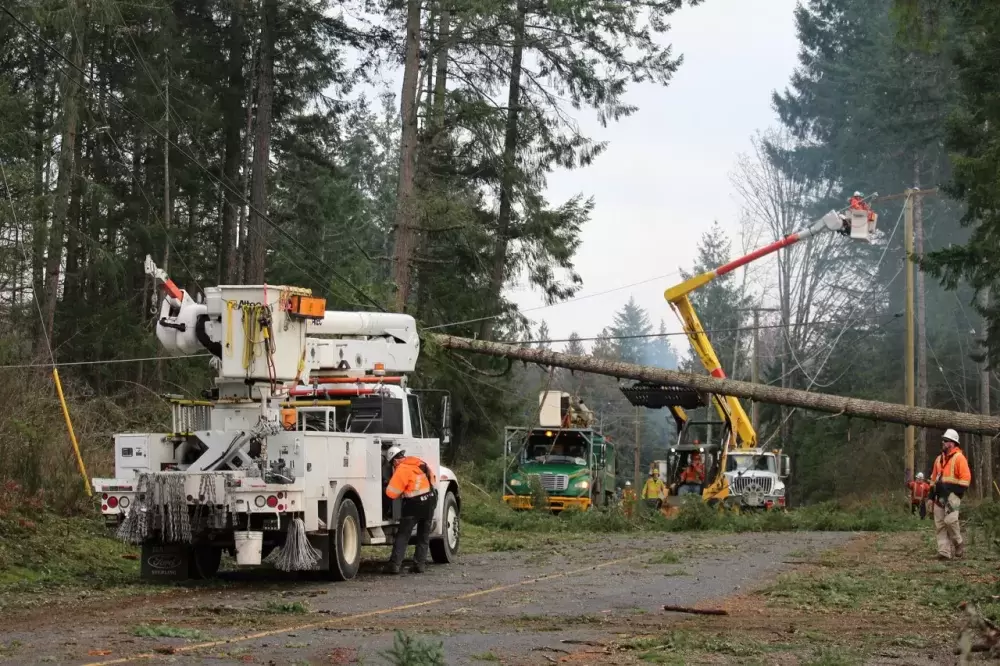A recent report from BC Hydro is showing the majority of people in the province are not heeding advice to prepare themselves for power outages caused by storms.
That’s even though British Columbia experienced a massive storm last December, the largest in BC Hydro history. More than 750,000 customers were without power following the late 2018 storm, which hit Dec. 20.
Power was not fully restored for some until Dec. 31. And about seven per cent of those BC Hydro customers that were affected were without power for more than three days.
Yet a recent BC Hydro report titled ‘Weathering the storm: Many British Columbians not prepared for increasingly severe winter storms’ proves the majority of those in the province are not taking proactive steps.
More than 60 per cent of those surveyed have not taken any action to be prepared for storm-related outages. And more than 50 per cent of people don’t have an emergency kit.
The majority of those that took part in the survey had been affected by last December’s windstorm.
“We wanted to find out how prepared people are,” said Ted Olynyk, BC Hydro’s manager of community relations for Vancouver Island and the Sunshine Coast. “This recent study has reported that they aren’t prepared.”
The study included responses from 800 British Columbia residents from across the province, both in urban and rural areas. The online survey was held over six days in mid-October.
BC Hydro officials have encouraged customers to be ready for power outages caused by storms. It is recommended to have an emergency kit for each member of the household for at least 72 hours. Emergency kits should include a flashlight with extra batteries, a first aid kit, necessary medications as well as non-perishable food and water.
Olynyk was not overly surprised to see the results of the recent study.
“It’s just a question of where they live and how much they were impacted by the last storm,” he said of customers’ lack of readiness for future storms. “And there’s also a feeling of it’s not going to be bad.”
Olynyk, who works out of the BC Hydro office in Nanaimo, said those that live in cities are less likely to be prepared for power outages.
“In the urban areas they don’t expect an outage to last more than 3-5 hours,” Olynyk said, adding those that live in places with nearby grocery stores tend to not keep much extra food on hand at home.
Olynyk also said those that live in rural areas could usually last longer without much hardship during outages as they would tend to have more food on hand as well as generators and or wood stoves which could be used if required.
“What the study told us is when you live in a remote area your ability to withstand a power outage is much longer,” he said.
The study found that about 30 per cent of those that live on Vancouver Island think that it is reasonable to be without power for up to 24 hours following a major storm.
Dianne Ignace, who has lived in Hesquiaht Harbour with her husband Dave for the past 44 years, has seen her share of storms over the years.
“We’re totally prepared here,” she said. “We could survive all winter.”
Ignace said each August or September her family heads to Tofino and buys enough dry goods to sustain them for several months. They also have a generator and solar panels on their porch.
The Ignaces often find themselves monitoring upcoming storms. And then they start to make boat travel plans to get needed supplies.
“We need a six-hour window to go to Tofino,” she said. “It takes two hours to get there, two hours to do your shopping and two hours to get back.”
Olynyk said those that live in British Columbia should indeed prepare themselves for future storms as there is evidence they will become more frequent and, in some cases, more severe.
Olynyk added it’s a good idea to have an emergency kit on hand because at some point B.C. will experience a major earthquake.
“It’s not a question of if, but when,” he said.
Olynyk added BC Hydro is has been upgrading its operations, making use of new technologies to better communicate with its crews and its operational centres so they can provide customers with timely information.
“We do what we can,” Olynyk said, adding customers should also take an interest and do their part to be prepared for possible lengthy power outages.
Meanwhile, provincial officials are suggesting that B.C. residents should also prepare themselves for conditions that could develop while driving.
This includes having a road safety kit in the car. Safety kits should include warm clothes, winter footwear, a shovel, a flashlight, a charged cellphone as well as food and water.







